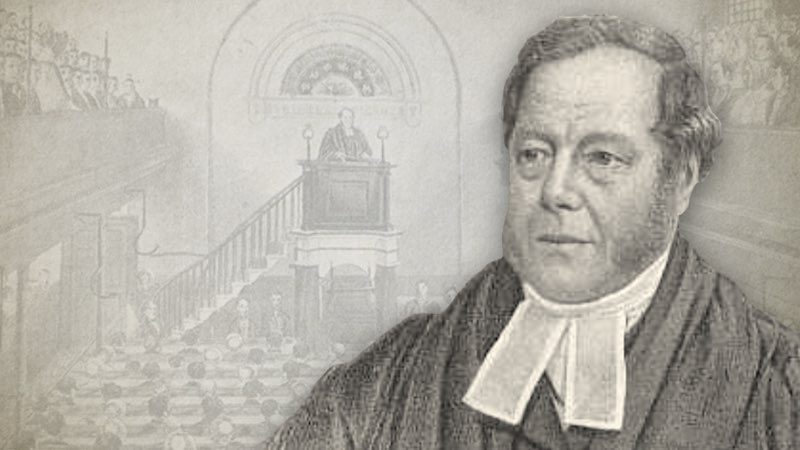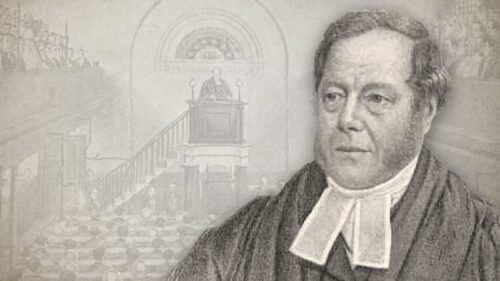-
The Origin And Teachings Of Conditional Primitive Baptists
The origin of the English Particular Baptists and the American Particular Baptists may be traced to the first half of the seventeenth century. Generally speaking, both groups came to embrace eighteenth century Hyper-Calvinism, but by the turn of the nineteenth century, were thrown into conflict by the newfangled teachings of Andrew Fuller. The English Particular Baptists separated into the Gillite (Hyper-Calvinist) and Fullerite (Moderate-Calvinist) camps (during the 1780’s), whereas the American Particular Baptists separated into the Primitive (Gillite) and Missionary (Fullerite) camps (during the 1830’s).
-
Book 3: Chapter 24, Election Confirmed By The Calling Of God
But that the subject may be more fully illustrated, we must treat both of the calling of the elect, and of the blinding and hardening of the ungodly. The former I have already in some measure discussed (chap. 22, sec. 10, 11), when refuting the error of those who think that the general terms in which the promises are made place the whole human race on a level. The special election which otherwise would remain hidden in God, he at length manifests by his calling. “For whom he did foreknow, he also did predestinate to be conformed to the image of his Son.” Moreover, “whom he did predestinate, them he also called; and whom he called, them he also justified,” that he may one day…
-
Book 3: Chapter 23, Refutation Of The Calumnies By Which This Doctrine Is Always Unjustly Assailed
The human mind, when it hears this doctrine, cannot restrain its petulance, but boils and rages as if aroused by the sound of a trumpet. Many professing a desire to defend the Deity from an invidious charge admit the doctrine of election, but deny that any one is reprobated (Bernard. in Die Ascensionis, Serm. 2). This they do ignorantly and childishly since there could be no election without its opposite reprobation. God is said to set apart those whom he adopts for salvation. It were most absurd to say, that he admits others fortuitously, or that they by their industry acquire what election alone confers on a few. Those, therefore, whom God passes by he reprobates, and that for no other cause but because he…
-
Book 3: Chapter 22, This Doctrine Confirmed By Proofs From Scripture
Many controvert all the positions which we have laid down, especially the gratuitous election of believers, which, however, cannot be overthrown. For they commonly imagine that God distinguishes between men according to the merits which he foresees that each individual is to have, giving the adoption of sons to those whom he foreknows will not be unworthy of his grace, and dooming those to destruction whose dispositions he perceives will be prone to mischief and wickedness. Thus by interposing foreknowledge as a veil, they not only obscure election, but pretend to give it a different origin. Nor is this the commonly received opinion of the vulgar merely, for it has in all ages had great supporters (see sec. 8). This I candidly confess, lest any…
-
Book 3: Chapter 21, Of The Eternal Election, By Which God Has Predestinated Some To Salvation, And Others To Destruction
The covenant of life is not preached equally to all, and among those to whom it is preached, does not always meet with the same reception. This diversity displays the unsearchable depth of the divine judgment, and is without doubt subordinate to God’s purpose of eternal election. But if it is plainly owing to the mere pleasure of God that salvation is spontaneously offered to some, while others have no access to it, great and difficult questions immediately arise, questions which are inexplicable, when just views are not entertained concerning election and predestination. To many this seems a perplexing subject, because they deem it most incongruous that of the great body of mankind some should be predestinated to salvation, and others to destruction. How ceaselessly…
-
Letter 9: To Beulah—On Union With Christ
My Dear Beulah, Permit me to address a word of congratulation to you, on the sacred, honorable, and indissoluble union which exists between Christ and your soul; a union planned in eternity, effected in the fulness of time and fraught with infinite and eternal advantages. The word of truth employs many delightful, metaphors to explain it, and affords many positive declarations of its reality— eternity— and vitality; and it is my object to present a scriptural view of it in a few lines, for the instruction and comfort of your mind; praying the Holy Spirit to assist me in writing and you in reading on this important subject. In the sacred volume we have a variety of the most beautiful imagery to represent the union…






